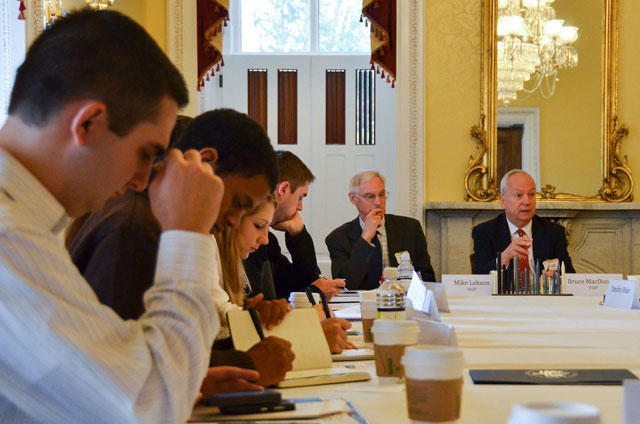USIP last month held a course for congressional staff entitled, “China, Pakistan and Nuclear Weapons: the Security Challenges for the United States.” The course was intended to provide context and background on both technical and policy issues related to nuclear nonproliferation.

November 19, 2012
USIP last month held a course for congressional staff entitled, “China, Pakistan and Nuclear Weapons: the Security Challenges for the United States.”
From October 17-18, USIP’s Bruce MacDonald and Mike Lekson ran a shorter version of arms control/nonproliferation courses that USIP’s Academy for International Conflict Management and Peacebuilding has offered for the last few years. MacDonald and Lekson provided context and background on both technical and policy issues related to nuclear nonproliferation, while USIP’s Moeed Yusuf discussed topics specific to Pakistan and the Heritage Foundation’s Dean Cheng focused on China.
“Nuclear weapons and the challenges they pose for U.S. security are going to be an important part of the congressional agenda for the foreseeable future, so we tried to help students understand both the incentives and disincentives for countries to seek nuclear capabilities and real world geopolitical and technical challenges in attaining such capabilities,” MacDonald said.
Staff from both houses of Congress and both parties participated in the course, which came about in response to interest on Capitol Hill in condensed versions of Academy courses. The course was scheduled during the October recess so that staffers could more easily attend the entire session.
Michael Walker, military legislative assistant to Louisiana Congressman Rodney Alexander, who was instrumental in encouraging and supporting the course on Capitol Hill, said “Learning about the context of the issues at hand is very important for congressional staff. I came away with a much better understanding of the topic and the regional dynamics – in this case, China and Pakistan. Too often, we only see things from our nation’s vantage point. But, as the Academy instructors highlighted, we also need to be aware of the interests of other nations so that we can better advance our own policy goals and relationships.”
Regarding the structure of the Academy’s course, Lekson said, “We are strong believers in interactive learning, so we did a different simulation each day and, to help our participants stretch themselves a little, we assigned them roles in the Executive Branch as they dealt with two very plausible nuclear crisis scenarios.”
Following the class, Walker noted, “The instructors did an exceptional job – and the course went over very well on the Hill. We had hoped that six or seven people would participate, but about 30 people showed up.”
Given the growing interest, the Academy hopes to be able to offer further courses for congressional staff on this and other relevant topics.
“The opportunity to teach a course in the U.S. Capitol to congressional staff was a real honor for us. We are very interested in offering other courses on relevant topics for congressional staff, and will do our best to tailor the subject matter, course length and timing to meet their very busy schedules,” Lekson said.